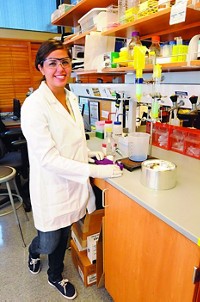Advertisement
Grab your lab coat. Let's get started
Welcome!
Welcome!
Create an account below to get 6 C&EN articles per month, receive newsletters and more - all free.
It seems this is your first time logging in online. Please enter the following information to continue.
As an ACS member you automatically get access to this site. All we need is few more details to create your reading experience.
Not you? Sign in with a different account.
Not you? Sign in with a different account.
ERROR 1
ERROR 1
ERROR 2
ERROR 2
ERROR 2
ERROR 2
ERROR 2
Password and Confirm password must match.
If you have an ACS member number, please enter it here so we can link this account to your membership. (optional)
ERROR 2
ACS values your privacy. By submitting your information, you are gaining access to C&EN and subscribing to our weekly newsletter. We use the information you provide to make your reading experience better, and we will never sell your data to third party members.
Careers
Nontraditional Paths
by Linda R. Raber
September 7, 2009
| A version of this story appeared in
Volume 87, Issue 36

A fractured economy, high unemployment, and a new Administration in Washington, D.C., have combined to make the outlook for the new academic year one of anxiety accompanied by hope for unprecedented growth. Many people who are pursuing bachelor’s degrees or looking to gain skills to remain competitive in the difficult job market are following nontraditional paths.
In July, during a speech at Macomb Community College, in Warren, Mich., President Barack Obama described his plan to increase the number of U.S. college graduates so that “by 2020, this nation will once again have the highest proportion of college graduates in the world.” The path to this goal, Obama believes, is the American Graduation Initiative, which he unveiled during the speech. The initiative is spelled out in Title V of H.R. 3221, the Student Aid & Fiscal Responsibility Act of 2009, which is now wending its way through Congress.
The initiative seeks $2.5 billion for construction and renovation of community colleges, $500 million to develop online college-level courses that will be offered free and for credit, and $9 billion for, in the President’s words, “competitive grants, challenging community colleges to pursue innovative, results-oriented strategies in exchange for federal funding.”
“We’ll challenge these schools to find new and better ways to help students catch up on the basics, like math and science, that are essential to our competitiveness,” Obama told a cheering crowd.
New high school graduates who have been keeping up with these developments may have considered waiting one year before entering college to reap the financial aid benefits of the legislation. Senior Editor Susan J. Ainsworth examines opportunities for science students who opt for a detour on their educational path. Ainsworth describes opportunities that await students who decide to take a “gap year” before starting college or graduate school.
Most of the money for postsecondary education promised by the President in his Macomb Community College speech is aimed directly at community colleges. Lacking prestige and grievously underfunded, these workhorses of the U.S. educational system have traditionally enrolled more than 45% of the nation’s undergraduates. Assistant Managing Editor Linda R. Raber examines the role of community colleges in educating the U.S.’s chemistry students along with the challenges they face, including overcrowding, stagnant budgets, and filling the educational gaps that come with many high school diplomas.
President Obama also believes that online education is one way students can access education for less money and on their own schedules. Funding for the development of online courses is a big part of his initiative. Associate Editor Linda Wang takes a look at the challenges and opportunities for online learners of the chemical sciences at all ages and career stages.





Join the conversation
Contact the reporter
Submit a Letter to the Editor for publication
Engage with us on Twitter